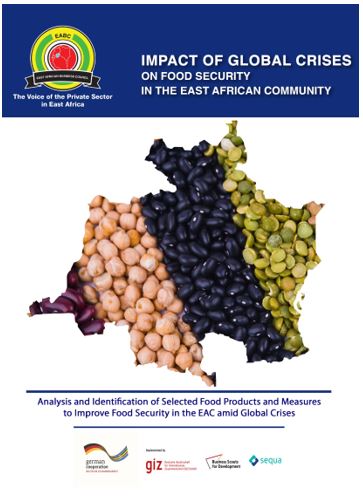The East African Business Council partnered with Sequa GmbH under the Business Scouts Fund in the project “Enhancing Competitiveness of Agri-food industry and Mitigating the Impact of Global Crises to Improve Food Security in the EAC Region” and organized a Webinar to validate the study on The impact of global crises on impact of global crises on food security in the EAC.
- Mr. John Bosco Kalisa, EABC Executive Director/CEO
- Mr. Gerald Masila, Executive Director, East African Grain Council
- Hon. Francoise Uwumukiza Provincial Advisor Kigali City
- Mr. Philipp Glaeser, Head of International Component, GIZ Business Scouts for Development
- Dr. Margaret Chemengich. Dr. Margaret Chemengich is a retired civil servant. She served in various public sector positions in Kenya Government including as the Permanent at the Ministry of Trade, Industry and Tourism, the Ministry of Planning, Director of Statistics at the Kenya National Bureau of Statistics (KNBS), as well as at the National Treasury. She continued to work in the development field on matters touching on policy, strategic interventions for national, regional integration and globalization programmes during her retirement. These included working with EAC, COMESA, WTO, World Bank, USAID, UN among others. In the course of her work, she interacted with private sector, civil society and the donor community. She has worked in several boards in the public and private sector.
- Chairperson of EALA Committee on Agriculture, Tourism and Natural
- Presentation – Study on Impact of Global Crises on Food Security in the EAC- Consultant
Resources
EAC (2023) The impact of global crises on impact of global crises on food security in the EAC # 114 p.
The study on impact of global crises on food security in the EAC reveals:
- The East African Community (EAC) is a region that faces challenges of food security, with Partner States as net food importers.
- The food production index for the EAC region is still low, and the bloc experienced low food production levels between 2014-2017.
- The region's staple food products are mainly cereals, such as maize, rice, and sorghum, which have a high import dependency ratio.
- The global crises, such as COVID-19 and the war in Ukraine, have led to volatile global and regional food prices, which have impacted food security.
- On positive side, the EAC countries have shown quick adaptability to the pandemic, with some countries improving their Global Food Security Index (GFSI) scores.
The micro, small, and medium enterprises (MSMEs) play the bigger role cuts across the entire food production and value chain. They deal in expanded commercialized agriculture with value additions such as milling; educate farmers on better farming practices; supervise agricultural producers around the most profitable sectors in their regions; among others. The private sector also plays an important part in food security as they are involved mainly in value addition such as bio-fortification, and in providing linkages to markets. (p. 72)
Recommendation related to climate adaptation in the EAC agricultural sector (p. 92):
- promotion of climate smart agriculture and enforcing of climate-smart technology;
- establish long-term irrigation initiatives;
- afforestation and reforestation;
- provision of a framework for mainstreaming climate change considerations into various sectoral policies and development planning at all levels;
- offering incentives for investments in low-carbon development;
- consultative effort by the governments, research institutions, and stakeholders in adopting climate-smart agriculture
EAC (2023) Policy brief on improving food security in EACamid global crises # 23 p.
Extract of the recommendations:
- Increase investment in local food production: The EAC region should prioritize increasing investment in local food production to reduce import dependency. This could include providing incentives for smallholder farmers, investing in infrastructure to improve food distribution and storage, and promoting sustainable agricultural practices.
- Diversify food crops: The EAC region should encourage the diversification of food crops to reduce reliance on a few staple crops of cereals. This could include promoting the cultivation of indigenous crops that are better adapted to local growing conditions and that are less vulnerable to climate change.
- Increase trade between EAC countries: The EAC region should prioritize increasing trade between member countries to reduce reliance on imports from outside the region. This could include reducing trade barriers and promoting regional integration.
- Improve food value chains: The EAC region should prioritize improving food value chains to reduce food waste and increase access to nutritious food. This could include investing in transportation infrastructure, improving food storage and processing, and promoting sustainable food production practices.
- Strengthen social safety nets: The EAC region should strengthen social safety nets to support vulnerable populations during periods of food insecurity. This could include providing cash transfers, food vouchers, and other forms of social protection to those in need.
- Address inflation and affordability of healthy diets: The EAC region should address the inflation and affordability of healthy diets by implementing policies that increase incomes and reduce food prices. This could include increasing agricultural productivity, reducing trade barriers, and promoting sustainable food production practices.
Background
The EAC has various policies and programs in place to enhance food security in the region.
These include:
- the EAC Agriculture and Food Security Policy,
- EAC Agriculture and Rural Development Strategy,
- EAC Agricultural and Rural Development Policy, and the EAC Food and Nutrition Security Policy.
The EAC developed the 1st Food Security Action Plan (FSAP) 2011-2015 and later the EAC FNSAP 2018-2022 to address persistent food insecurity issues. The East Africa Food and Nutrition Security Strategy (FNSS) 2019-2023 was also developed to provide a unified approach to implementation, coordination, and monitoring of food and nutrition security programs.




No comments:
Post a Comment